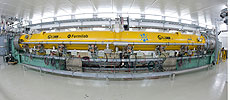Successful cryomodule test at Fermilab lays groundwork
 |
The successful testing of this cryomodule at Fermilab will pave the way for future projects. Photo: Reidar Hahn |
Scientists and engineers recently completed testing Fermilab's first SRF cryomodule, CM1, in what they are calling a successful experiment. The R&D knowledge gained from this testing will pave the way for more advance cryomodules for linear accelerators, such as the proposed Project X and ILC.
"We wanted to prove that we can operate and support SRF technology at Fermilab," said Elvin Harms, who is responsible for coordinating CM1 operations. "This experiment was a huge success and a great learning experience. A large number of people at Fermilab can take pride in contributing to this achievement."
Superconducting radio-frequency cavities accelerate particles by sustaining an electric field that oscillates between positive and negative pulses to push and pull charged particles from one cavity to the next. SRF cavities can generate accelerating voltages orders of magnitude higher than their room-temperature counterparts. CM1 consists of eight SRF cavities that were originally assembled and tested at the Deutsches Elektronen-Synchrotron (DESY) laboratory in Germany. These eight cavities and additional components were shipped to Fermilab for configuring and testing.
"CM1 arrived as a kit," Harms said. "It was our prototype to learn about building SRF components into a complete assembly and then operating it."
With assistance from counterparts at DESY and the INFN/LASA laboratory in Italy, technicians pieced together CM1 and shipped the completed cryomodule to Fermilab's NML. Here, engineers ran electricity through the cryomodule and measured the accelerating field and electrical efficiency both at room temperature and cooled to 2 Kelvin, which is -460 degrees Fahrenheit.
"The warm testing trains the components and clears any impurities, especially on the input couplers," Harms said. "The cold testing is what allows scientists to analyze the performance of each piece as well as the cryomodule as a whole. This type of experimentation allowed us to train ourselves on the technology and master it. Of course it's a continuous learning experience."
Read more
—Sarah Charley
|